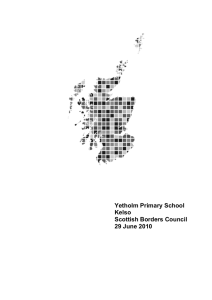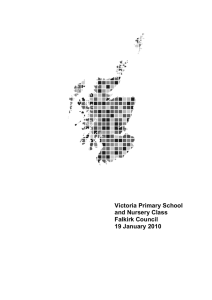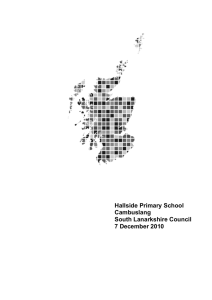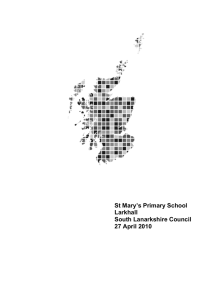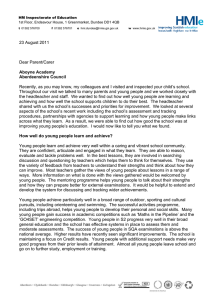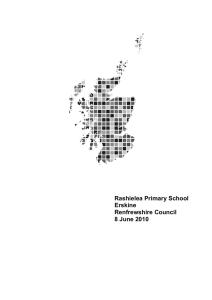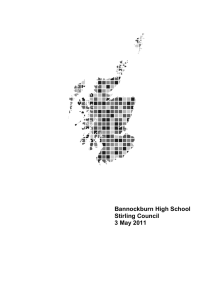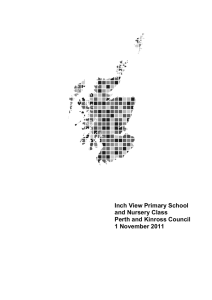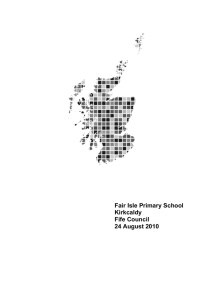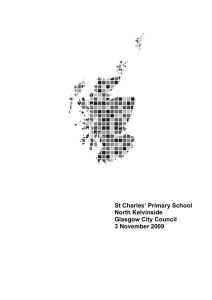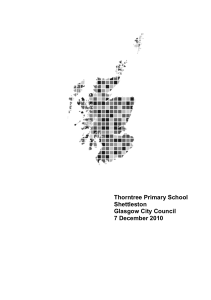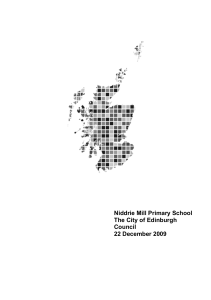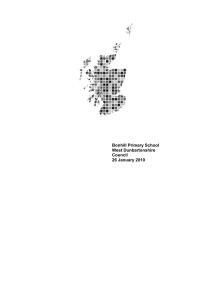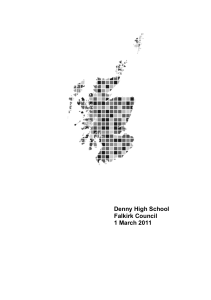Udston Primary School Hamilton South Lanarkshire Council
advertisement
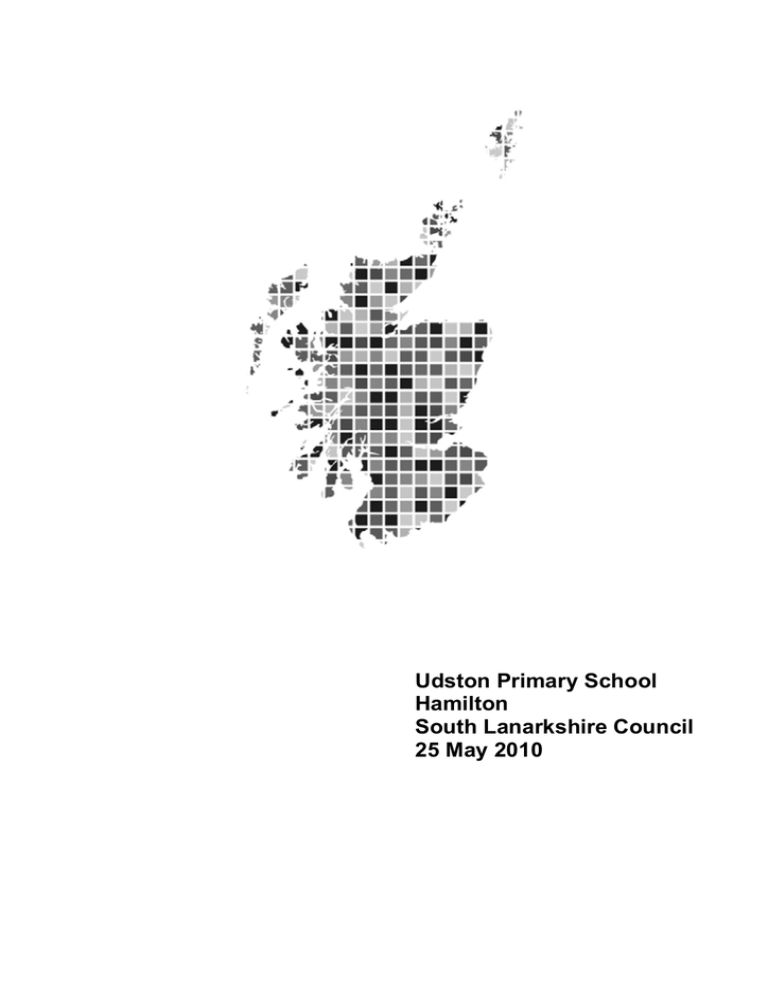
Udston Primary School Hamilton South Lanarkshire Council 25 May 2010 HM Inspectorate of Education (HMIE) inspects schools in order to let parents1, children and the local community know whether their school provides a good education. Inspectors also discuss with school staff how they can improve the quality of education. At the beginning of the inspection, we ask the headteacher and staff about the strengths of the school, what needs to improve, and how they know. We use the information they give us to help us plan what we are going to look at. During the inspection, we go into classes and join other activities in which children are involved. We also gather the views of children, parents, staff and members of the local community. We find their views very helpful and use them together with the other information we have collected to arrive at our view of the quality of education. This report tells you what we found during the inspection and the quality of education in the school. We describe how well children are doing, how good the school is at helping them to learn and how well it cares for them. We comment on how well staff, parents and children work together and how they go about improving the school. We also comment on how well the school works with other groups in the community, including services which support children. Finally, we focus on how well the school is led and how staff help the school achieve its aims. If you would like to learn more about our inspection of the school, please visit www.hmie.gov.uk. Here you can find analyses of questionnaire returns from children, parents and staff. We will not provide questionnaire analyses where the numbers of returns are so small that they could identify individuals. 1 Throughout this report, the term ‘parents’ should be taken to include foster carers, residential care staff and carers who are relatives or friends. Contents 1. The school 2. Particular strengths of the school 3. How well do children learn and achieve? 4. How well do staff work with others to support children’s learning? 5. Are staff and children actively involved in improving their school? 6. Does the school have high expectations of all children? 7. Does the school have a clear sense of direction? 8. What happens next? 1. The school Udston Primary School is a non-denominational school. It serves the Hillhouse area of Hamilton and the West Craigs area of Blantyre. The roll was 163 when the inspection was carried out in March 2010. Children’s attendance was below the national average in 2008/2009. The school is due to move into a new building in the autumn of 2010. 1 2. Particular strengths of the school • Outstanding care and welfare which creates a very positive environment for learning. • Confident, well-behaved children who benefit from a wide range of opportunities for achievement. • Partnership with parents and the wider community to support children’s learning and improve the school. • Recent important improvements in providing high-quality learning experiences. • Leadership for learning across the school. 3. How well do children learn and achieve? Learning and achievement Almost all children are confident, eager learners who take responsibility for many aspects of their learning. They are treated fairly and feel safe and happy in school. They are very good at working in teams and learning independently. Children respect their teachers and each other. They contribute well to discussions about their learning. They know staff value their opinions. They are confident in assessing their own and others’ work and celebrate each other’s success. In most classes, children use information and communications technology successfully to enliven their learning. For example, children in P4 enjoy creating their own learning DVDs which they take home to share their learning with parents. Children in P5 made a video about the Romans and organised a film premier. 2 All children are developing very well socially and personally. Their achievements are many and varied. Children increase their confidence and develop skills through learning new sports like curling. A large number perform in school shows and musical performances in the community. At all stages, children produce a high standard of artwork which the school is proud to exhibit for visitors. Children demonstrate strong communication and organisational skills through, for example, enterprise projects on the circus, Burns and Udston’s Got Talent. Children in P4 recently hosted a French café to display their work to other classes. Children lead many of the school’s health promotion activities. Their knowledge of healthy lifestyles is strong. At P1 and P2, children take part in regular lunchtime Fun Fitness sessions which raise their awareness of the importance of being fit and healthy. At P6, most children achieve awards in cycling proficiency. Children could be more involved in developing a profile of their wider achievements to reflect on their strengths and aspects for development. Children are increasing their knowledge of Scotland’s history and geography. Initiatives such as their link with a school in Spain and fundraising for international charities add a global dimension to their learning. Children’s attainment in English language and mathematics has improved in recent years. There are promising signs of continued improvement. Children with additional support needs are making appropriate progress in developing literacy and numeracy skills. Almost all children listen attentively to teachers’ instructions and explanations. During discussions, almost all children participate confidently and explain their views clearly. The majority of children attain appropriate national levels in reading and mathematics. Less than half achieve these levels in writing. From P1 to P7 most children enjoy reading and can describe books they have read. At P2 and P3 around half of children are reading beyond levels expected at these stages. Staff need to ensure all children read appropriately challenging books and different types of reading material. Staff have introduced more active learning approaches which are increasing children’s motivation for writing. Almost all children in P2 can write short sentences and most can do so independently. From P3, most 3 children write well for a range of purposes. Children are enthusiastic about mathematics. Most perform written calculations neatly and accurately. They are improving their mental mathematics skills. From P1 to P7, almost all children cope well with problem solving activities. Teachers’ approaches to giving children feedback on their work vary across the school. Teachers skills and confidence in assessing children’s progress are increasing. Teachers should continue to work with children to set appropriate targets for progress in English language and mathematics and support children’s understanding of how to improve their achievements. Curriculum and meeting learning needs Across the curriculum, children’s learning is active, relevant and very enjoyable. Staff have made significant progress in implementing national guidance on Curriculum for Excellence. Staff select resources appropriately and use them creatively to plan learning which motivates children. They follow children’s interests and involve them in planning what and how they will learn. Children appreciate the many excursions to places of educational interest which enhance their learning. Enterprise, health and wellbeing and citizenship are strong, positive features of the curriculum. The school is now planning to develop its eco work. Most children benefit from two hours of good quality physical education each week. Through an extensive programme including home visits, and an open day which gives a taste of primary school life, children joining P1 are well prepared. There is scope to further strengthen the curriculum through links with subject staff at Calderside Academy to ensure continuity and progression in children’s learning from P7 to S1. All staff know the children well. They respond to children’s emotional and social needs sensitively and appropriately. Tasks and activities are planned well and adapted to meet most children’s learning needs. Staff should continue to increase the level of pace and challenge for higher-achieving children. A few staff have developed approaches to assessment which give them a detailed picture of children’s strengths and development needs. This good practice should continue to be 4 shared across the school. Children with additional support needs are supported effectively by class teachers and specialist staff. Appropriate support plans are in place for those who require them. Learning targets are regularly reviewed by parents, children and teachers. However, children’s progress towards these targets is not always measured appropriately. Across the school, homework is varied and well planned to support children’s learning in school. 4. How well do staff work with others to support children’s learning? Parents are very positive about the school. The strong home-school partnership work across the community has been successful in raising parents’ confidence. This helps them to make positive contributions to the work of the school. The school is a welcoming environment for parents. The active Parent Council contributes much to the life and work of the school. For example, through decisions about the new school building and fundraising to support school activities. A significant number of parents have completed training and support children’s learning, for example, through paired reading. Other parents join classes to cook with their children or come and talk to children about their own jobs. Staff provide a range of helpful information such as the P1 and P2 ‘Ask me about’ leaflets which enable parents to support children’s learning at home. The headteacher ensures any complaints are resolved quickly. Arrangements to inform parents about sensitive aspects of health education are appropriate. Strong partnership with the local church brings an added dimension to school life. Working with a local artist, children recently designed new stained glass windows for the church. The church sponsors the school football team. Children’s learning is further supported by a wide range of community partners. The Crucial Krew emergency services team, the active sports coordinator and staff at the Jock Stein Community Centre contribute much to activities which build on the school’s health promotion work. Although their opinions are sought and valued, these partners could be more 5 systematically involved in evaluating aspects of school life and planning for continued improvement. 5. Are staff and children actively involved in improving their school community? All staff take responsibility for leading aspects of school improvement. Catering, cleaning, janitorial and clerical staff are included effectively in the work of the school. They contribute to health promotion work, the production of school shows and excursions. Staff demonstrate high levels of commitment and high standards of professionalism. Teachers and pupil support staff make effective use of their professional development activities to enhance the curriculum and improve learning and teaching. They meet in teams to discuss formally aspects of their work and share good practice. They should now build on this strong teamwork to develop consistently high-quality learning experiences for all children. The role of the pupil council has recently been reviewed so that children discuss improvements in the classroom as well as in the wider life of the school. Through the eco and health committees many children are effective leaders within the school community. The school has achieved a gold award for health promotion and an Eco-Schools Scotland bronze award. 6. Does the school have high expectations of all children? All children respond very well to staff’s high expectations for behaviour and learning. Children are polite, very well behaved and proud to talk about their school. All staff are fully aware of their responsibilities for safeguarding children. They welcome children to lessons and provide high levels of care and welfare. Children’s attendance is monitored carefully and any issues followed up promptly. There has been an improvement in children’s attendance recently. Religious observance is well planned. Children respect the diverse beliefs and shared values within their school community. Staff promote children’s 6 understanding of equality and diversity through learning across the curriculum. 7. Does the school have a clear sense of direction? The well respected headteacher knows her school well. She gives a high level of commitment to the school. Supported effectively by the principal teacher she has established strong teamwork and a positive ethos which underpins all aspects of the school’s work. Recent significant improvements in learning and teaching have begun to raise children’s attainment. There is a strong sense of the school as an integral part of a community which is keen to improve the children’s life chances. The headteacher and her staff should continue to build on their recent good work to ensure sustained improvements in children’s attainment. The whole school community should be involved in a renewal of the school’s aims and values to set a clear vision for the future of this hardworking, effective school. 8. What happens next? We are confident that the school will be able to make the necessary improvements in light of the inspection findings. As a result, we will make no more visits in connection with this inspection. The school and the education authority will inform parents about the school's progress in improving the quality of education. Our District Inspector will maintain contact with the education authority to monitor improvements in learners' achievement. 7 We have agreed the following areas for improvement with the school and education authority. • Continue to develop consistent approaches to assessment, tracking and monitoring children’s progress with the aim of raising children’s attainment, particularly in writing. • Ensure the pace and challenge of learning is appropriate to meet the varying needs of all learners. Quality indicators help schools and nursery classes, education authorities and inspectors to judge what is good and what needs to be improved in the work of a school and a nursery class. You can find these quality indicators in the HMIE publications How good is our school? and The Child at the Centre. Following the inspection of each school, the Scottish Government gathers evaluations of three important quality indicators to keep track of how well all Scottish schools and nursery classes are doing. Here are the evaluations for Udston Primary School. Improvements in performance Learners’ experiences Meeting learning needs satisfactory very good good We also evaluated the following aspects of the work of the school. The curriculum Improvement through self-evaluation HM Inspector: Patricia Watson 25 May 2010 8 very good very good When we write reports, we use the following word scale so that our readers can see clearly what our judgments mean. excellent very good good means means means satisfactory weak unsatisfactory means means means outstanding, sector leading major strengths important strengths with some areas for improvement strengths just outweigh weaknesses important weaknesses major weaknesses If you would like to find out more about our inspections or get an electronic copy of this report, please go to www.hmie.gov.uk. Please contact us if you want to know how to get the report in a different format, for example, in a translation, or if you wish to comment about any aspect of our inspections. You can contact us at HMIEenquiries@hmie.gsi.gov.uk or write to us at BMCT, HM Inspectorate of Education, Denholm House, Almondvale Business Park, Almondvale Way, Livingston EH54 6GA. Text phone users can contact us on 01506 600 236. This is a service for deaf users. Please do not use this number for voice calls as the line will not connect you to a member of staff. You can find our complaints procedure on our website www.hmie.gov.uk or alternatively you can contact our Complaints Manager, at the address above or by telephoning 01506 600259. Where the school has a nursery class, you can contact the Complaints Coordinator, Headquarters, Care Commission, Compass House, Riverside Drive, Dundee DD1 4NY, telephone 0845 603 0890. Crown Copyright 2010 HM Inspectorate of Education
